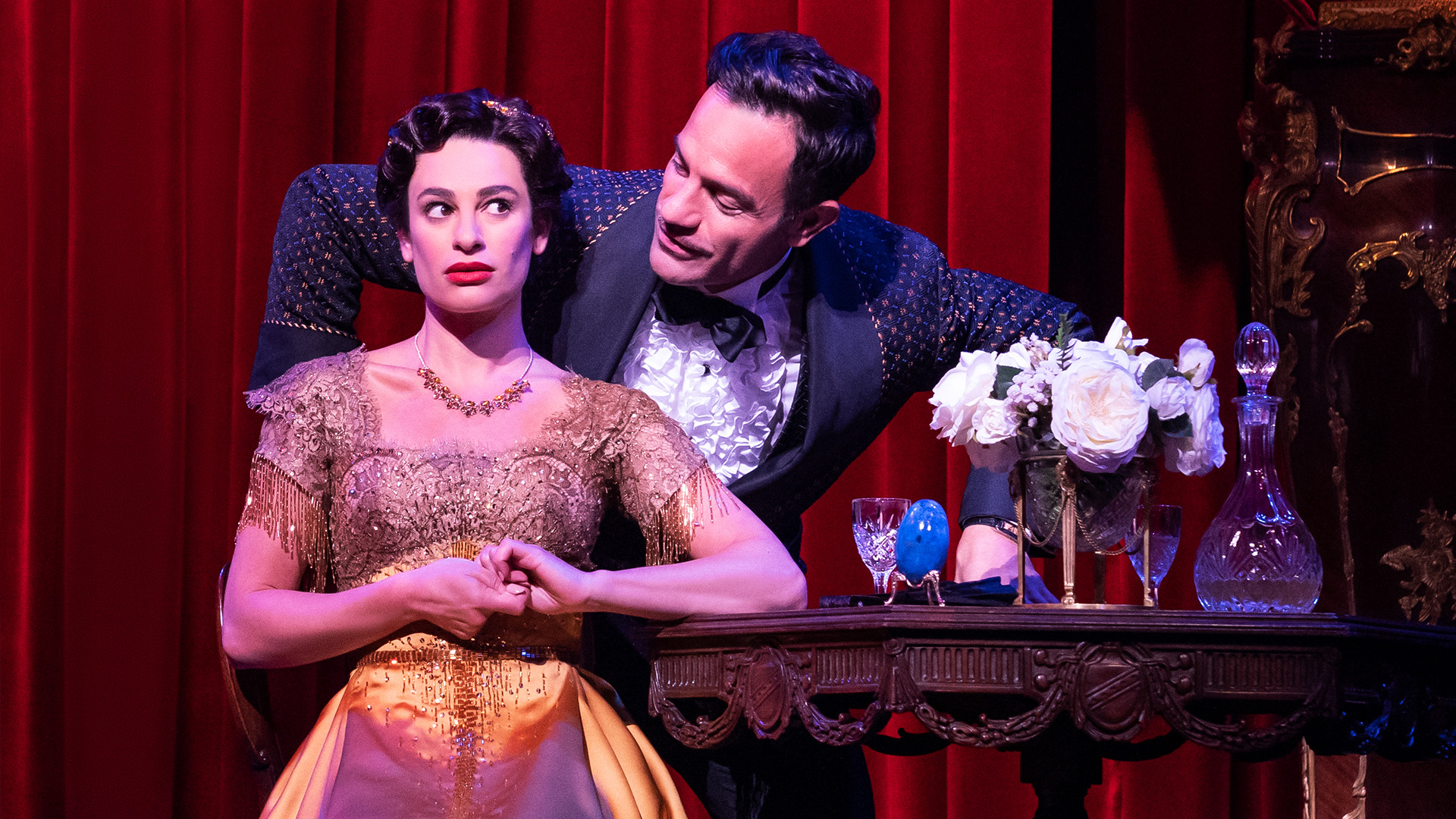
Funny Girl (US/UK), with its sweeping score, grand romance and side-splitting bits, chronicles the rise of comedian Fanny Brice and her marriage to the suave Nicky Arnstein. But behind the iconic score and glittering costumes were real people with dramas that extend beyond the stage. Explore the real-life people of Funny Girl.
Fanny Brice
In the Show:
Fanny is a young woman from Henry Street in Manhattan’s Lower East Side. Raised by a single mother and a gaggle of poker-playing Jewish women, Fanny presents herself as an unstoppable force (or, in her words, “The Greatest Star”). As in many rise-to-fame narratives, she is first fired from a downtown theatre when she fails to fit in as a chorus girl, but with her no-lose attitude, she finds her way back to the stage and accidentally falls into her destined roll as a comic.
It is on the same night of her first stage triumph that she meets the love of her life, Nicky Arnstein. And soon, she gets a call from Ziegfeld himself. Fanny becomes an instant Follies sensation with her biting, risqué premises and powerful singing voice. As her star continues to rise, she secures the man of her dreams and begins a family. But Fanny’s unstoppable fame threatens Nicky, who becomes tired of playing second fiddle. Through Nicky’s incarceration and decision to divorce, Fanny remains a pillar of self-assurance, self-reliance and unbridled star power.
In real life:
Fania Borach (October 29, 1891 – May 29, 1951) was born on the Lower East Side of Manhattan, the third child of Jewish immigrants, Rose and Charles Borach. The Borachs’ marriage mirrored Fanny’s marriage many years later; Rose was a smart, ambitious businesswoman, but Charles ended up gambling away the family’s money and Rose divorced him in 1902, moving the children from Newark, New Jersey (where they had spent the bulk of their childhoods) to Brooklyn.
Shortly after this relocation, Fanny dropped out of the eighth grade to pursue a career as a performer. She got her start in 1906, doing amateur nights at Keeney’s Theatre on Brooklyn’s Fulton Street, where she was met with success. While Funny Girl depicts Fanny’s rise to fame as relatively instant, in reality she toiled away for ten years before finally hitting it big.
Before the Follies, Fanny made a name for herself in burlesque, where she began to use the surname “Brice” rather than “Borach,” since it was often mispronounced. At this time, she also began performing comedic songs with a Yiddish accent, capitalizing on the ethnic comedy still in vogue for the early 20th century. By 1910, Brice was hired by Florenz Ziegfeld, Jr. for his Follies. Her part in the Follies was initially very small, and Ziegfeld did not renew her contract after 1911. For a period of five years, she worked instead with the rival Shubert organization until rejoining the Follies in 1916, when she finally soared to stardom. Her career would include a lasting friendship with Irving Berlin, several albums, and a successful radio show (as her famous character “Baby Snooks”) until her sudden death in 1951.
Like any celebrity, she found herself in a number of public scandals; hers related to the crimes of her husband, Nicky Arstein. Brice had been married briefly prior to meeting Arnstein, but had secured a divorce in 1910. She met Nicky in 1912 and was instantly head-over-heels in love. The pair married in 1918 and had two children. For two years things were stable, but in 1920 Arnstein was arrested for an attempted bond robbery. He was convicted and began an appeals process for four years, until he was incarcerated. Arnstein and Brice finally divorced in 1927 due to the discovery of Nick’s affair with an older, wealthy woman. Brice was granted sole custody of their children and she never saw Arnstein again.
Brice would go on to marry once more. However, in her memoirs she acknowledged the sacrifices a woman must make in order to have a career in the early 20th century, meaning she had to put her job above her family. Though some critics point to Brice’s capitalizing on ethnic stereotypes, her comic gift still goes unquestioned. Ambitious, tenacious and tough, Brice was a survivor of a ruthless business and achieved greatness on her own terms. She is still remembered as a pioneer for women in comedy and surely paved the way for figures like Lucille Ball, Carol Burnett, Amy Poehler, Ali Wong, and so many more.
Nicky Arnstein
In the show:
Nicky Arnstein stumbles into Brice’s life, almost immediately lovestruck by Fanny’s unique comic voice and tenacious drive. He comes across as an honest man who is even forthcoming about his gambling lifestyle. Seemingly destined for Brice, Nicky begins a passionate affair with her, leading to a blissful marriage and a beautiful daughter.
But as the marriage progresses, Nicky cannot keep up with Fanny’s stardom — the unstoppable quality he first fell in love with. Recognizing his inability to feel equal in his marriage, he willingly gives himself up after being arrested for fraud and insists on a divorce, knowing he’s no good for Fanny. The two part tenderly, remembering how they fell in love and acknowledging what they mean to one another.
Suave, charming, secure — and in the case of Omar Sharif — smoldering, Nicky Arnstein is the dreamboat-bad-boy you want to take home to mother.
In real life:
Julius Wilford Arndstein [later “Arnstein”] (July 1, 1879 – October 2, 1965) was a professional gambler and con artist, born in 1879 to a German-Jewish and a Dutch immigrant. The middle child of three, he grew up in New Jersey and earned the nickname “Nicky” after the nickel plates on his bicycle as a boy.
Arnstein began his gambling career on transatlantic cruise liners and European casinos. By the time he met Fanny Brice in 1912, after a performance of The Whirl of Society, Arnstein was already married. Undeterred, the pair began a six-year-long affair which finally ended in marriage in 1918. To Fanny, Arnstein was every bit the man he is in Funny Girl — handsome, cultured, exciting, and loving — where in reality, Nicky was simply a con artist who operated under a number of aliases and failed at everything he attempted. He was sent to Sing Sing prison in 1915 for a failed wire-tapping scheme but still managed to come out with a fiancé.
Once they were able to marry, their wedded bliss was to be short lived. In 1920, Arnstein was accused of orchestrating a Wall Street bond robbery, after which he fled New York for two months before surrendering to the authorities. Brice, however, was convinced of his innocence and financed his trial and lengthy appeal and remained loyal to him throughout his incarceration. 1927 finally brought their divorce after he was released from Leavenworth prison, as he had not also been loyal to her. Brice later admitted that she was shocked he did nothing to stop the criminal proceedings or contest to her having sole custody of their two children. Arnstein then disappeared from Brice’s life – not at all the man she thought she had married.
As far as we know, Arnstein was able to stay out of trouble for the rest of his life and lived long enough to see himself immortalized in the 1964 Broadway production of Funny Girl, produced by Ray Stark, the husband of his daughter Francis. From all accounts the actual Nicky’s character was deemed unacceptable for a leading man, and thus, Fanny’s initial, romantic opinion of him became his historic character.
Florenz Ziegfeld Jr.
In the show:
Ziegfeld is the king of Broadway, whose Follies is the créme-de-la-créme of vaudeville. When Fanny finally gets an audition for Ziegfeld, he is immediately impressed with the young girl, but makes it clear that he will not be defied. But Fanny’s determination, show-business-smarts, and undeniable star power get through to the domineering Ziegfeld and he becomes more of a kind, if gruff, father figure.
In real life:
Florenz Ziegfeld Jr. (March 21, 1867 – July 22, 1932) was one of the most important and influential producers in the history of the Broadway musical. Ziegfeld was born in Chicago in 1867; his first spectacular is said to have been the Great Chicago Fire. Music and show business were in Ziegfeld’s blood, as his father ran the Chicago Music College and later opened a nightclub.
On a trip to Europe, Ziegfeld met the Polish-French singer Anna Held, who first introduced him to the idea of an American imitation of the Parisian Folies Bergère. This imitation became known as the Ziegfeld Follies, which first opened in July of 1907 and continued annually until 1931 (with two renewals in 1934 and 1936). These revues were best known for their lavish costumes and sets, beautiful women, and fresh talent (including Nora Bayes, Fanny Brice, Ruth Etting, Will Rogers, Bert Williams, and many more). The Follies also featured choreographed numbers from such composers as Irving Berlin, George Gershwin and Jerome Kern. Ziegfeld was also involved as a producer on Show Boat (US/UK), a cornerstone show in the history of musical theatre.
Ziegfeld’s personal life was equally extravagant. He had a common-law marriage to Anna Held until 1913, when she divorced him due to an affair. The affair in question was with a showgirl named Lillian Lorraine, whom Ziegfeld had discovered when she was 15 and built up as one of the most popular attractions at the Follies. While the two never married, he remained in love with her for the rest of his life. After his divorce, he married actress Billie Burke, best known as Glinda in The Wizard of Oz (US/UK) in 1914 and they had one child, Patricia.
Ziegfeld ended up losing the bulk of his money in the stock market crash of 1929, and he died in 1932. This financial trouble at the end of his life forced Burke to pursue a career in film to settle his many debts — but at least we got a good witch out of it.
For more information about Funny Girl, visit the Concord Theatricals website in the US or UK.

Newly Available for Licensing – January 2026 (UK)

Newly Available for Licensing – January 2026 (US)




